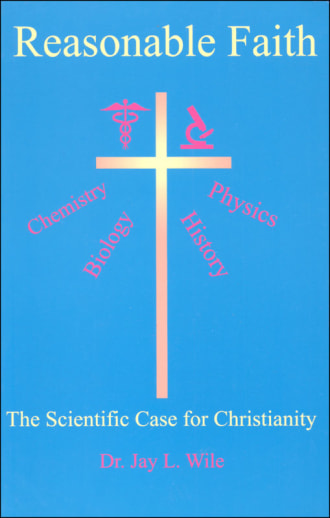How do we navigate the anti-Christian views of science? This book helps build a Christian apologetics approach to evolutionary science. I recommend starting this book at the end. Why? In the last chapter, the author explains his coming to faith from a scientific and atheistic viewpoint, while sharing the scientific community’s inherent bias against a Christian worldview. This background is helpful to understand as you move through the book’s concepts. In this volume, scientist and prolific author of home school science curriculum, Dr. Jay Wile provides four chapters outlining scientific facts that support design theory. He also evaluates the question of miracles, highlights the beauty of nature—all while pointing to the Designer and Creator. Each chapter includes end notes and diagrams. You’ll also find a chart of 45 messianic prophecies and Bible predictions. 118 pgs, pb.
Reasonable Faith
SKU
009339
ISBN
9780965629409
Grade 9-AD
These icons are designed to help you quickly understand and learn important information about our products.
Teaching Method
Traditional
Teacher-centered curriculum commonly used in classrooms that may include a text, teacher manual, tests, etc.
Charlotte Mason
A methodology based on the work of a 19th century educator who maintained that children learn best from literature (Living Books), not textbooks.
Classical
A methodology based on the Latin Trivium (three stages of learning), including the grammar stage (memorization and facts), logic stage (critical thinking), and rhetoric stage (developing/defending ideas).
Unit Study
A thematic or topical approach centered around one topic that integrates multiple subject areas.
Montessori (Discovery)
A methodology based on the work of a 20th century educator that emphasizes student and sensory-driven discovery learning and real-life applications.
Other
Other methodologies
Religious Content
Secular
Contains content contrary to common Christian beliefs (i.e. evolution).
Neutral
Avoids religious or theoretical topics or presents multiple viewpoints without preference.
Christian/Religious
Faith-based or including instructional religious content.
Learning Modality
Auditory
Learns through listening, talking out loud or reading out loud.
Visual
Learns through seeing, prefers written instructions and visual materials.
Kinesthetic/Tactile (Hands-On)
Learns through moving, doing and touching.
Multi-Sensory
Curriculum that employ a variety of activities/components.
Presentation
Sequential
Curriculum progresses through well-defined learning objectives. Emphasizes mastery before moving to the next topic.
Spiral
Topics and concepts are repeated from level to level, adding more depth at each pass and connecting with review.
Conceptual/Topical
Focus is on the “why,” often with a unifying concept as well as specific skills; coverage may be broader.
Teacher Involvement
Low Teacher Involvement
Student-led materials; parent acts as a facilitator.
Medium Teacher Involvement
A mix of teacher-led time and independent student work.
High Teacher Involvement
Teacher-led lessons; may utilize discussions, hands-on activities and working together.
Additional Materials Required
No other materials needed
Everything you need is included.
Other Materials Required
There are additional required resources that are a separate purchase.
Other Materials Optional
There are additional resources mentioned or recommended but are not absolutely necessary.
Consumable
Consumable
Designed to be written in; not reusable.
Non-Consumable
Not designed to be written in; reusable.
Our Price
$10.00 Description
Publisher's Description of Reasonable Faith
Reasonable Faith is a concise, easy-to-read book that outlines the scientific evidence that supports the validity of the Christian Faith. It begins by highlighting the physical, chemical, and biological evidence indicating that the world was designed. The author demonstrates that science points unmistakably to the existence of God. He then uses historical, archaeological, and medical evidence to show that this God is the God of the Bible. This book contains powerful arguments that will challenge the non-Christian and bolster the faith of Christians.
Category Description for Discovering Design with Biology Suggested Supplements
Suggested by Dr. Wile for science-oriented students, these supplemental books offer more depth for interested students. Resources are completely optional and do not replace the textbook content.
Details
| Product Format: | Paperback |
|---|---|
| Grades: | 9-AD |
| Brand: | Berean Builders |
| ISBN: | 9780965629409 |
| Length in Inches: | 8.5 |
| Width in Inches: | 5.5 |
| Height in Inches: | 0.4375 |
| Weight in Pounds: | 0.55 |
Videos
Reviews

